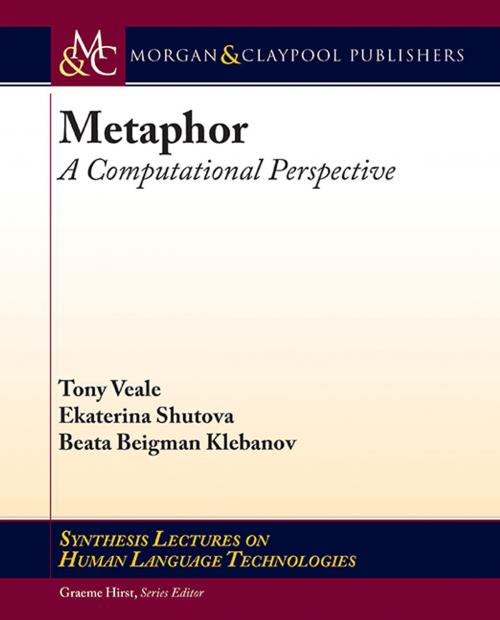Metaphor
A Computational Perspective
Nonfiction, Computers, Advanced Computing, Natural Language Processing, Artificial Intelligence, Reference & Language, Language Arts, Linguistics| Author: | Tony Veale, Ekaterina Shutova, Beata Beigman Klebanov | ISBN: | 9781681731834 |
| Publisher: | Morgan & Claypool Publishers | Publication: | February 29, 2016 |
| Imprint: | Morgan & Claypool Publishers | Language: | English |
| Author: | Tony Veale, Ekaterina Shutova, Beata Beigman Klebanov |
| ISBN: | 9781681731834 |
| Publisher: | Morgan & Claypool Publishers |
| Publication: | February 29, 2016 |
| Imprint: | Morgan & Claypool Publishers |
| Language: | English |
The literary imagination may take flight on the wings of metaphor, but hard-headed scientists are just as likely as doe-eyed poets to reach for a metaphor when the descriptive need arises. Metaphor is a pervasive aspect of every genre of text and every register of speech, and is as useful for describing the inner workings of a "black hole" (itself a metaphor) as it is the affairs of the human heart. The ubiquity of metaphor in natural language thus poses a significant challenge for Natural Language Processing (NLP) systems and their builders, who cannot afford to wait until the problems of literal language have been solved before turning their attention to figurative phenomena. This book offers a comprehensive approach to the computational treatment of metaphor and its figurative brethren—including simile, analogy, and conceptual blending—that does not shy away from their important cognitive and philosophical dimensions. Veale, Shutova, and Beigman Klebanov approach metaphor from multiple computational perspectives, providing coverage of both symbolic and statistical approaches to interpretation and paraphrase generation, while also considering key contributions from philosophy on what constitutes the "meaning" of a metaphor. This book also surveys available metaphor corpora and discusses protocols for metaphor annotation. Any reader with an interest in metaphor, from beginning researchers to seasoned scholars, will find this book to be an invaluable guide to what is a fascinating linguistic phenomenon.
The literary imagination may take flight on the wings of metaphor, but hard-headed scientists are just as likely as doe-eyed poets to reach for a metaphor when the descriptive need arises. Metaphor is a pervasive aspect of every genre of text and every register of speech, and is as useful for describing the inner workings of a "black hole" (itself a metaphor) as it is the affairs of the human heart. The ubiquity of metaphor in natural language thus poses a significant challenge for Natural Language Processing (NLP) systems and their builders, who cannot afford to wait until the problems of literal language have been solved before turning their attention to figurative phenomena. This book offers a comprehensive approach to the computational treatment of metaphor and its figurative brethren—including simile, analogy, and conceptual blending—that does not shy away from their important cognitive and philosophical dimensions. Veale, Shutova, and Beigman Klebanov approach metaphor from multiple computational perspectives, providing coverage of both symbolic and statistical approaches to interpretation and paraphrase generation, while also considering key contributions from philosophy on what constitutes the "meaning" of a metaphor. This book also surveys available metaphor corpora and discusses protocols for metaphor annotation. Any reader with an interest in metaphor, from beginning researchers to seasoned scholars, will find this book to be an invaluable guide to what is a fascinating linguistic phenomenon.















